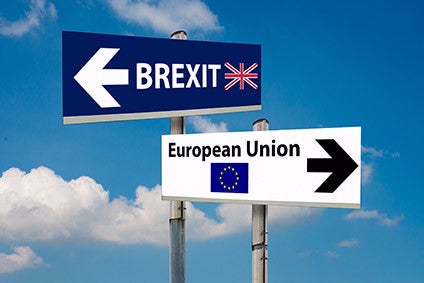
Britain’s Society of Motor Manufacturers and Traders (SMMT) says the UK’s decision to leave the European Union (EU) was driven by worries surrounding immigration and national control, rather than pure economics.
The UK is now entering a period of frenetic activity as politicians scramble to work out the finer details of trade negotiations ahead of new Prime Minister, Theresa May’s decision to start formal exit procedures using the Article 50 mechanism, although the British High Court now says Parliament must debate the terms.

Discover B2B Marketing That Performs
Combine business intelligence and editorial excellence to reach engaged professionals across 36 leading media platforms.
“Business economics was not the motivation for the result,” said SMMT chief executive, Mike Hawes at last week’s JAMA-CLEPA Business Summit in Venice. “British people were concerned about immigration and sovereignty and a degree of scepticism to Brussels.
“Economic arguments were not what motivated the result. The outcome was a vote to leave and the UK will leave the European Union. What that should look like is uncertain. UK government has made clear it will look to control immigration and look to change the relationship the UK has with Europe. That is clearly not just our industry, but to the wider business sector at large.
“We need to achieve a favourable trade negotiation while satisfying domestic concerns around immigration. How easy that is, is very difficult to gauge – I personally can’t see it being an outcome satisfactory to everyone. They are creating new government departments trying to look at the issues around trade and trying to see what is the best option for the UK and to a certain extent, the rest of Europe.”
Fears surrounding Brexit were somewhat assuaged last week with a vote of confidence from Nissan after the automaker revealed it would produce the next Qashqai and will also add production of the next X-Trail model at its Sunderland plant.
To a very large extent however, the decision of the UK to quit the 28-strong European club is pushing Brussels and London into hitherto unknown territory as both sides try to achieve their goals; Britain trying to square the circle of immigration control with free trade access and the Commission anxious not to trigger a stampede of members looking for the exit.
“Brexit is one of the major challenges, not just facing the UK, but also Europe and potentially globally as well,” added Hawes. “As a sector we are totally integrated into the European automotive industry. A lot of attention in the UK is on the City of London, but that is unique. UK automotive is not unique – we are part of the automotive fabric.
“The UK wants a unique deal because the relationship between the UK and rest of Europe is different to Norway, Turkey, Switzerland [for example]. The UK government is trying to achieve a solution which allows for growth and in terms of UK automotive, it has been growing significantly.
“Nissan has recommitted additional production capacity to Sunderland. That is based on assurances given by the UK government the UK will remain competitive. The challenge is squaring the need of business with the demand of the population to look at immigration, [but] we still desperately need talented people to come.
“We would still like to remain within the Single Market. That may not be possible. In that case we have to negotiate a deal which allows the industry to grow both in the UK and Europe for the benefit of everyone.”






